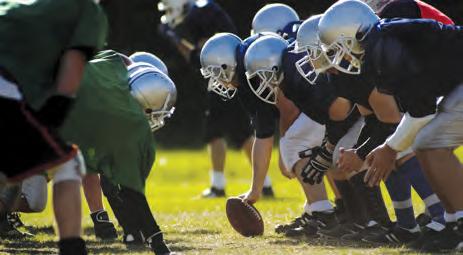
10 minute read
National diversity
from Engleski 1
Track 18
LEAD-IN
Advertisement
1 Do you think that people in foreign countries are different from people in yours?
If you do, what differences can you mention? 2 Which of the following do you think is the best way to learn about the characteristics of a nation?
Travelling to a foreign country Having a computer pen friend Reading books by foreign authors Meeting foreign people Watching films
READING
Read the text once and circle the correct answer according to the opinions expressed in the talk show.
1. The three young Brits have learned about America a. from books and films. b. by meeting people. 2. Americans ................... people they don’t know. a. don’t mind talking to b. don’t socialize with 3. Americans seem to a. enjoy life and work. b. spend a lot of time enjoying themselves. 4. In modern times, different nationalities have many characteristics in common. a. True b. False
The British journalist Mark Lowell asked Anna Perry, Ian Holmes and Michael Wright, three young Brits who had just returned from America, to take part in his talk show on national differences.
Mark Lowell: Do you think that there are stereotypes that can be applied to the Americans and the English?
Ian: When we talk about national stereotypes, most of the time these images are created by popular books, animated cartoons, films or propaganda. Although these types of behaviour are certainly not exclusively typical of only one nationality, I believe that there are some characteristics which can be found in most Americans or Englishmen.
Anna: I often heard the Americans boasting about their friendliness and openness. I think it is true that they are, on the whole, much more spontaneous than the British. They are generous (they spend a lot of money on all kinds of charities), lively and amusing, kind, good-tempered, goodhumoured and inquisitive. On the other hand, the English are considered to be more reserved; they like to keep themselves to themselves and praise privacy.
61
Michael: During my stay in America I realized that the Americans don’t think it is ill-mannered to ask personal questions; they enjoy being sociable and they do not mind explaining to foreigners everything about baseball, their favourite game.
Mark: What about the stereotype that a typical American works hard?
Ian: Yes, they work hard and they are always in a hurry, but they also try to spend some time relaxing - watching sports, going to the cinema, and travelling. However, these characteristics are true for the modern English, too. The only difference is that the Americans adore baseball, basketball and American football, while the English prefer to play and watch cricket and football.
62
Mark: People often mention ‘the American Dream’. Can you tell us something about it?


Michael: The American dream is being successful in one’s job, success earned by your own skill and hard work. America is a society which values competition highly and admires the self-made man, no matter what kind of family he comes from.
Mark: We are talking here about the average American or Brit, but don’t you think that we have to keep in mind the fact that these countries, like many others, have a great number of immigrants?
Ian: Yes, that’s true. The immigrants try to keep their traditions and languages, but the majority of them also try to become a part of society.
Anna: I quite agree. In the cafe near my house all the employees are from different countries of the European Union and quite often you can hear different languages. I think that diversity of languages and cultures is a benefit to every country.
Glossary
diversity – variety generous – willing to give money or help freely charity – an organization that collects money for people in need inquisitive – curious, interested to value – estimate, rate something

COMPREHENSION
Find evidence in the text which says that

1. we can always find some characteristics that people of the same nationality have in common. 2. the Americans give all kinds of donations. 3. the English are not considered very sociable. 4. the Americans are always ready to talk about their favourite sports. 5. people in America are valued for what they are and what they can do. 6. both countries have accepted a great number of immigrants.
VOCABULARY
a cb
PHRASES with KEEP
A Transform sentences 1–6 by using the correct phrase with KEEP without changing the meaning of the underlined parts of the sentence. off up with doing something a promise (an appointment) a diary in mind something from someone in touch KEEP oneself to oneself up appearances fit a straight face
Example: Don’t let the children walk on the grass. Keep the children off the grass. 1. I’m doing special exercises in order to stay healthy. 2. You should remember that she is an old lady and needs special care. 3. He doesn’t socialize most of the time. 4. She doesn’t tell me her secrets. 5. Her dress was so funny that I couldn’t stop myself from laughing. 6. Since my family left the town, I have stayed in contact with James.
B Discuss these questions in pairs or groups. 1. Where can you usually see the sign ‘Keep off the grass’? 2. Do your best friends keep their secrets from you? 3. In which situations can’t you keep an appointment? 4. Do you always keep in mind the advice your parents give you?

VERBS WITH PREPOSITIONS
Many words are associated with a particular preposition. When you learn a new word, try to learn the preposition that goes with it. A good dictionary usually gives you examples. Here are some common verbs that are associated with a particular preposition:
accuse somebody OF apologize FOR arrive AT/IN a place apply TO boast ABOUT/OF congratulate somebody ON depend /rely ON somebody/something explain something TO somebody insist ON + -ing look AT/FOR pay somebody FOR something participate IN something provide someone WITH succeed IN something spend money/time ON worry ABOUT something
63
Use the verbs from the box to complete the sentences.
1. Ask your partner to _____________ to you the meaning of the phrase ‘stand for’. 2. What does your partner ______________ his/her pocket money on? 3. What time do you usually______________ at school? 4. Would you ever _____________ to your friend for something you haven’t done? 5. Have you ever ________________ your partner of cheating on a test? 6. One of our students_____________ in a discussion organized by the Olympic Committee.
WORD FORMATION Making nouns (2)
The suffix -ness is added to adjectives to form abstract nouns denoting quality or state. E.g. friendly – friendliness; open – openness
1 Make other nouns by adding the suffix -ness to the adjectives below.
Pay attention to spelling changes.
kind - calm polite - ready - happy - weak tidy sad -
2 Complete the sentences by choosing nouns from the box.
1. She inherited some money, but it didn’t bring her __________________________. 2. I was very grateful for his __________________________ to help me when I was in trouble. 3. She has a __________________________ for sweets. 4. I am really impressed by your __________________________ - everything is in the right place. 5. I felt a deep __________________________ upon hearing the news of her tragic end.
COMMUNICATION
EXPRESSING OPINIONS
Asking for opinions Giving opinions
What do you think of/about…? What’s your opinion of….? How do you feel about …..? Does it seem to you that …? Do you agree with…? I think / don’t think we (should, can…)… I believe (that) ….. In my opinion,… I feel / don’t feel that… It seems to me …
64
1 Complete the sentences using the expressions in the box. 1. ____________________ Gone with the Wind is the best movie ever made. 2. ____________________ get a new car. 3. ____________________ smoking should be forbidden in restaurants. 4. ____________________ the movie? I thought it was boring. 5. ____________________ it’s the right thing to do. 6. ____________________ that Marco’s proposal is a good idea?
2 Answer the following questions. 1. What do you think about national differences? 2. What national characteristics are mentioned in the text National diversity? 3. Do any of these characteristics surprise you, based on what you know about a) the Americans? b) the British? 4. In your opinion, which of them best describes a) the average American? b) the average Brit? 5. In the text, find words which you can attribute to people in your country.
GRAMMAR
PRONOUNS
1 Reflexive pronouns
Look at this example and answer the questions below.
They like to keep themselves to themselves. 1. How do we form reflexive pronouns? 2. Is there any difference between the singular and plural forms? 3. When do we use reflexive pronouns?
2 Indefinite pronouns / adverbs
Look at these examples:
1. Tell us something about ‘the American
Dream’. 2. They can explain everything about baseball.
Before you start doing exercises, study the PRONOUNS table in the Grammar summary.
PRACTICE
1 Complete these sentences using the appropriate reflexive pronoun.
1. He has kept _______________ busy by staying in shape playing golf. 2. Professional basketball players have to look after ________________. 3. We enjoyed __________________ watching the basketball match between the Lakers and the Bulls. 4. I always burn ________________ when putting a cake in the oven. 5. The dog looked at ___________________ in the mirror.

65
2 Complete these sentences with the correct indefinite pronoun/adverb.
1. ______________ phoned asking for you, but didn’t say his name. 2. ___________ has brought food for the party. We have nothing to eat. 3. _____________has taken her bicycle. How will she get to school? 4. She lives ______________ near her school. She’s a lucky girl! 5. They couldn’t find her watch ______________ although they searched the whole house.
BRITISH AND AMERICAN ENGLISH
In the text, find the words which are spelt / pronounced differently or have different names in American English. This table will help you.
Vocabulary
BE autumn chemist’s floor pavement shop railway taxi lift AE fall drugstore storey sidewalk store railroad cab elevator
Spelling
BE travelled tyre programme behaviour catalogue centre colour theatre AE traveled tire program behavior catalog center color theater
Differences in pronunciation:
BE AE dance /da:ns/ - dance /dæns/ hurry /hΛri/ - hurry /h3:ri/
Differences in using prepositions:
BE AE See you on Monday. /See you Monday. at the weekend / on the weekend write to someone / write someone Are you at home? /Are you home?
WRITING
Famous Americans
1 These people in the pictures are / were famous writers, sportsmen, political leaders, inventors, or actors, who became known not only nationwide but all over the world.
66
Ernest Hemingway
writer and journalist
Thomas Edison
inventor
Walt Disney
film producer
Martin Luther Michael Jordan
King basketball player fought for the rights of African
Americans
Meryl Streep
actress
2 Choose one person and write a short composition about their life and achievements. Try to find as much information as possible on the Internet or in books.
THE GREAT AMERICAN QUIZ
Geography
1. New York has got a nickname a. The Big Apple b. The Big Pear c. The Big Orange 6. The second most commonly spoken language in the USA is: a. Chinese b. Spanish c. Japanese
2. Which of these parks is in New York? a. Hyde Park b. Yellowstone Park c. Central Park

3. The longest river in the USA is a. the Mississippi b. the Missouri c. the Hudson
History
4. The first men landed on the Moon in a. 1968 b. 1969 c. 1970
People
7. Tom Sawyer was written by a. Jack London b. Ernest Hemingway c. Mark Twain
8. Who received the Nobel Prize in Literature, in 2016? a. Bob Dylan b. Bill Clinton c. Neil Armstrong
9. Who played the lead role in The Pirates of the Caribbean films? a. Harrison Ford b. Tom Cruise c. Johnny Depp
5. The American Civil War was fought between ______ of the country. a. the south and the east b. the north and the south c. the east and the west 10. Who became famous for Microsoft computer operating systems? a. Thomas Edison b. Bill Gates c. Alexander Bell
QUOTATIONS
Discuss in pairs the following quotations. ‘Generosity is giving what you could use yourself.’ (Unknown) ‘Kindness is a language which the deaf can hear and the blind can read.’ (Mark Twain)






